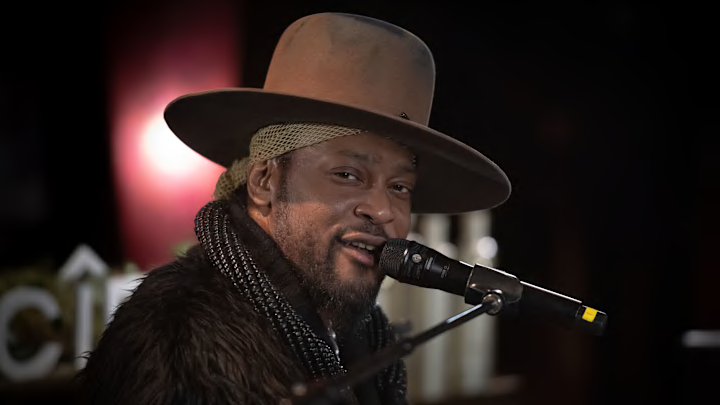On Tuesday, the music world was hit with the tragic news that R&B singer D'Angelo had died at the age of 51. According to a statement put out by his family, the cause of death was cancer, which he had been battling privately.
Losing an artist like D'Angelo at an age as relatively young as 51 is certainly awful, and longtime fans have been understandably saddened by the news. Even so, solace can be taken in the fact that his music will continue to resonate with listeners for the foreseeable future, keeping his memory alive.
That resonance and appreciation is very much deserved. Despite a relatively sparse catalogue, especially in recent years, D'Angelo's work was monumental for the R&B genre. Relatedly, the trajectory of his career was also quite unique to him. His career arc is worth recalling, now more than ever.
The career path of D'Angelo was one of a kind
D'Angelo's debut album, Brown Sugar, came out in the middle of 1995. In the years preceding the album, he had built up industry experience and hype by virtue of being a member of several different groups, as well as through writing for a number of other artists. Brown Sugar, then, was D'Angelo stepping out as a star in his own right.
It took a bit for Brown Sugar to fully pick up steam, but pick up steam it did, buoyed by singles like the title track and "Lady." D'Angelo's rich crooning and falsetto were standout, and sound excellent to this day. They certainly did back in the mid-90s, when this album spent 65 weeks on the Billboard 200.
Additionally, Brown Sugar is often credited as a major moment in the mainstream recognition of neo-soul, a genre that had been germinating during this era in the 1990s. It was a sound that laced soul with other elements like funk, rock, and hip-hop. Thus, Brown Sugar was just as impactful as it was successful.
After finding success with his debut and spending a period of time touring, D'Angelo initially found himself struggling to write a follow-up. As a result, it would be almost five years before his sophomore album, 2000's Voodoo, would release. The wait proved to be well worth it.
Voodoo was not a redux of Brown Sugar, and there was clear contrast between the two records. Voodoo was a longer and more challenging project sonically, as opposed to its cleaner and more radio-friendly predecessor.
It also leaned even further into the hip-hip influence that Brown Sugar had displayed, with artists such as DJ Premier, Redman, and Method Man getting involved. D'Angelo was still working within the neo-soul lane he had started with, but on Voodoo, he expanded the sound.
The most iconic track from Voodoo was "How Does It Feel." The music video, which infamously was filmed as a single shot of a bare D'Angelo singing, was simultaneously controversial and captivating. The song itself, which is great, is a seven minute slow-burn with a terrific buildup to a soaring hook.
In many ways, Voodoo was a representation of D'Angelo at his peak as an artist. However, this ended up being a double-edged sword for him, ultimately leading to the massive gap that exists between his second and third records.
The attention that D'Angelo received as a result of the "How Does It Feel" music video left him feeling increasingly uncomfortable. This, coupled with persistent personal issues, ended up influencing D'Angelo to largely recede from the limelight for a full fourteen years, with nothing more than sparse offerings in the music realm.
This anonymous period following Voodoo, when considering what could have been, is a huge what-if in music history. At the same time, perhaps things were always destined to play out as they did. Either way, an extended gap once again didn't prevent fans from raving when 2014's Black Messiah finally did come out.
Black Messiah was yet another standout release in D'Angelo's catalogue. It came out in the midst of controversial decisions in Ferguson, and with relation to Eric Garner, and was influenced on some level by that.
D'Angelo built on the more challenging aspects of Voodoo, and with more live instrumentation. There were fairly typical tracks topically from D'Angelo, but also others that explored more pressing social issues. All of that culminated into a worthwhile release from the Virginia native.
D'Angelo would once again fall back post-Black Messiah, with a handful of singles and appearances basically constituting the extent of his public presence until present-day. Knowing what we know now, it's understandable why.
The unexpected loss of D'Angelo really sucks. If nothing else, hopefully this moment will be the catalyst for those unfamiliar with his work to check him out and appreciate his excellence. Today, those already in the know certainly are.
